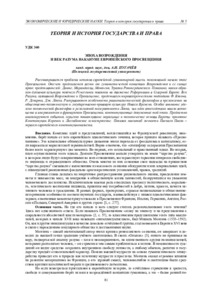Please use this identifier to cite or link to this item:
https://elib.psu.by/handle/123456789/7536Full metadata record
| DC Field | Value | Language |
|---|---|---|
| dc.contributor.author | Пугачев, А. Н. | - |
| dc.date.accessioned | 2014-10-21T11:48:40Z | - |
| dc.date.available | 2014-10-21T11:48:40Z | - |
| dc.date.issued | 2014 | - |
| dc.identifier.citation | Вестник Полоцкого государственного университета. Серия D, Экономические и юридические науки : научно-теоретический журнал. - 2014. - № 5. - С. 81-91. | ru_RU |
| dc.identifier.issn | 2070-1632 | - |
| dc.identifier.uri | https://elib.psu.by/handle/123456789/7536 | - |
| dc.description | The Renaissance and the Age of Reason on the Eve of the European Enlightenment / A. Pugachev, Kand. Jurid. Nauk, Doc. (Polockij Gosudarstvennyj Universitet) | ru_RU |
| dc.description.abstract | Рассматривается проблема истоков европейской гуманитарной мысли, положившей начало эпохе Просвещения. Отсчет предлагается вести от гуманистической концепции Возрождения и ее самых ярких представителей: Данте, Мирандоллы, Монтеня, Эразма Роттердамского. Показано, каким образом духовная культура позднего Ренессанса повлияла на движение Реформации в Северной Европе. Век Разума, связавший Возрождение и Просвещение, представлен мировоззренческими подходами Ф. Бэкона, Р. Декарта, Дж. Локка. Раскрываются особенности рационалистической философии в преломлении на общественно-политическую и государственно-правовую культуру Нового Времени. Особое внимание уделено политической философии и религиозной толерантности Локка, чьи идеи впоследствии нашли воплощение в американском и французском Просвещении, конституционных документах той эпохи. Предметно анализируются события, серьезно пошатнувшие моральные и политические основы Европы: принятие Конституции Корсики и Лиссабонское землетрясение. Показан масштаб личности Паскаля Паоли – первого европейского конституционалиста. = The problem of sources of the European humanitarian thought which has laid the foundation of an era of the Enlightenment is considered. It’s offered to reckon from the humanistic concept of the Renaissance and her brightest representatives: Dante, Mirandolla, Montaigne, Erasmus. It is shown how the spiritual culture of the late Renaissance influenced Reformation movement in Northern Europe. The Age of Reason which has con-nected the Renaissance and the Enlightenment, is presented by F. Bacon, R. Descartes, J. Locke’s world outlook approaches. Features of rationalistic philosophy in refraction on political and state and legal culture of the New Age reveal. The special attention is paid to political philosophy and Locke’s religious tolerance, whose ideas found subsequently an embodiment in the American and French Enlightenment, the constitutional documents of that era. The events which have seriously shaken moral and political bases of Europe are in detail analyzed: adoption of the Constitution of Corsica and Lisbon earthquake. The scale of the identity of Pasquale Paoli – the first European constitutionalist is shown. | ru_RU |
| dc.language.iso | ru | ru_RU |
| dc.publisher | Полоцкий государственный университет | ru_RU |
| dc.relation.ispartof | Веснік Полацкага дзяржаўнага ўніверсітэта. Серыя D, Эканамічныя і юрыдычныя навукі | be_BE |
| dc.relation.ispartof | Herald of Polotsk State University. Series D, Economics and law sciences | en_EN |
| dc.relation.ispartof | Вестник Полоцкого государственного университета. Серия D, Экономические и юридические науки | ru_RU |
| dc.relation.ispartofseries | Серия D, Экономические и юридические науки;2014. - № 5 | - |
| dc.rights | open access | ru_RU |
| dc.subject | Теория и история государства и права | ru_RU |
| dc.subject | Возрождение | ru_RU |
| dc.subject | Просвещение | ru_RU |
| dc.subject | Ренессанс | ru_RU |
| dc.subject | Реформация | ru_RU |
| dc.subject | Новое время | ru_RU |
| dc.title | Эпоха Возрождения и Век Разума накануне европейского Просвещения | ru_RU |
| dc.type | Article | ru_RU |
| Appears in Collections: | 2014, № 5 | |
Items in DSpace are protected by copyright, with all rights reserved, unless otherwise indicated.
